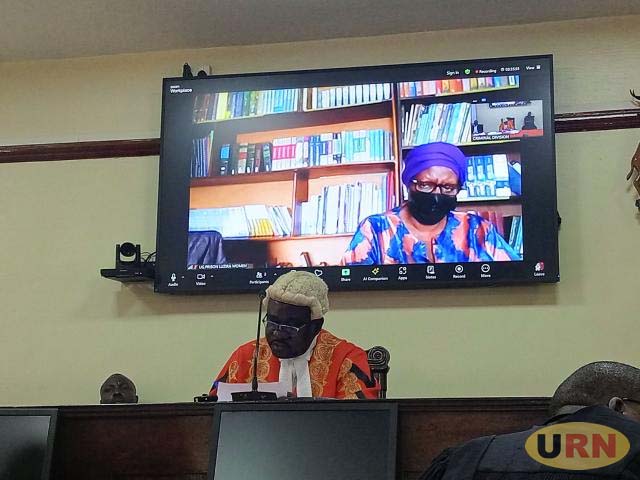
Naome Nyangweso in the spot light again, Judge Muwata to deliver ruling Thursday on contentious issues
Kampala, Uganda | THE INDEPENDENT & URN | The defense team representing Molly Katanga, has accused prosecution witness Naome Nyangweso of leading a group, including police detectives and state operatives, to visit prison and coerce one of the accused to make false accusations to incriminate Molly.
During today’s proceedings, the defense team accused Nyangweso, along with former Deputy Attorney General Mwesigwa Rukutana, Assistant Inspector of Police (AIP) Wilber Tworekirwe, and lawyer Lesta Kaganzi, of visiting Amanyire in prison to pressure him into implicating Molly in her husband’s death.
According to defense lawyer John Jet Tumwebaze, the group, including Nyangweso, visited the prison in February 2024, arriving between 2:27 and 2:30 p.m., signing in at two-minute intervals, suggesting they entered together.
Nyangweso allegedly promised Amanyire freedom within two and a half hours if he cooperated, stating that she treated him like a son, having employed him for six years before linking him to work at the Katanga home.
The court, presided over by Judge Isaac Muwata of the Criminal Division, heard from the defense that Amanyire initially shared his account of events, which described Molly being tortured and beaten by Henry Katanga.
However, Nyangweso allegedly pressured him to alter his statement to incriminate Molly, threatening him that he would “rot in prison” like Molly and her daughters if he did not comply.
The defense also revealed that Nyangweso brought other detectives to prison to hear Amanyire’s version of events. When Amanyire declined, saying he had narrated the incident five times, she allegedly pleaded with him to repeat it for her new visitors.
Tumwebaze said, “Nyangweso told Amanyire that he had a night to make up his mind and see if he can change his statement and implicate Molly for shooting the husband,” adding that Amanyire was promised freedom within two and a half hours if he backtracked on his statements. The defense further alleged that Nyangweso organized a team of senior detectives from CID Kibuli and officials from the office of the Director of Public Prosecutions to help change his statement.
The following day, on February 8, 2024, Assistant Commissioner of Police Lydia Katono and Chief State Attorney Jonathan Muwaganya reportedly visited Amanyire in prison.
Additionally, Tumwebaze said that AIP Tworekirwe had previously visited Amanyire with two other senior CID officers, Nelson Natumanya and Harriet Nalubega, a week before Nyangwesho’s visit.
The defense contends that these visits were intended to reinforce Nyangweso’s coercion and secure Amanyire’s revised testimony. To support their claims, Tumwebaze presented a letter from Kigo Prison, signed by Assistant Superintendent of Prison Justine Eyilu, confirming the visit.
The defense is trying to demonstrate that Amanyire was coerced into testifying against Molly, arguing that Henry Katanga’s death was a case of domestic violence leading to suicide, rather than murder.
Additional testimony from Amanyire stated that he saw Molly crawling out of the bedroom naked and requesting help to call her daughters.
He was reportedly told to go away from the bedroom door when he went to check on her following screams. Amanyire said that Molly, who was injured, was later carried upstairs and dressed by her daughters before he helped carry her to a vehicle.
After cross-examination, Tumwebaze sought to submit a court order and two letters from Uganda Prison Services as defense exhibits, but his request met strong objection from the prosecution.
The letters, dated August 20 and 26, 2024, allegedly contain records of visits to Amanyire while he was on remand at Kigo Prison.
Prosecutor Jonathan Muwaganya raised concerns about the court order’s authenticity and validity, arguing, “The court order does not explicitly state the parties involved or the judicial officer who issued it. Additionally, the law firm Kampala Associated Advocates (KAA) is listed as the applicant, but the specific advocate who filed the application remains unknown.”
Muwaganya also questioned the relevance of the documents to the witness being cross-examined, stating, “The witness has no apparent connection to these documents. They were not authored by her, nor addressed to her. She is a stranger to these documents.”
In response, defense lawyer Elison Karuhanga countered that the court order is genuine and was issued by the Chief Magistrate Court at Kajjansi on August 24, 2024. “The court order bears the signature and seal of the Chief Magistrate, and the applicant, KAA, is clearly stated,” he explained.
He further argued that the Access to Information Act allows for ex-parte applications, and the Evidence Act recognizes the court order as a public document.
Karuhanga accused the prosecution of attempting to obstruct fairness and justice, emphasizing, “The court order is a crucial piece of evidence, and its submission should not be blocked.”
Judge Muwata is set to deliver his ruling tomorrow, Thursday, October 17, 2024.
 The Independent Uganda: You get the Truth we Pay the Price
The Independent Uganda: You get the Truth we Pay the Price





